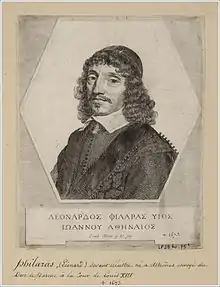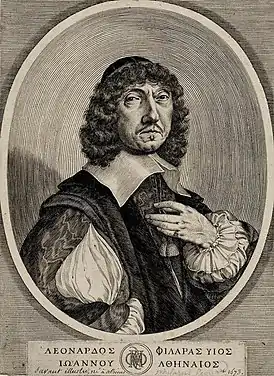Филарас, Леонардос
Леонардос Филарас (греч Λεονάρδος Φιλαράς Афины 1595—1673[1], известен также на французском как Leonard Philara или Villeret, Villare)[2], греческий учёный из Афин[3], политик дипломат и медик,[4] советник французского королевского двора, протеже кардинала Ришелье[5] Один из ранних деятелей движения за греческое освобождение.[6]

Леонардос Филарас работа Меллан, Клода, 1673.
| Леонардос Филарас | |
|---|---|
| Λεονάρδος Φιλαράς | |
 Леонардос Филарас, 1658 | |
| Дата рождения | 1595 |
| Место рождения | Афины, Османская Греция |
| Дата смерти | 1673 |
| Место смерти | Афины, Османская Греция |
| Род деятельности | учёный, политик, дипломат, медик, советник французского королевского двора, |
Биография
Леонардос Филарас — грек[2][7][8][9]. Родился в Афинах в 1595 году в знатной семье[10]. Переехал в Рим в молодом возрасте, где получил образование, и стал послом при французском дворе от Пармских герцогов. Филарас потратил большую часть своей карьеры и жизни пытаясь убедить Западную Европу оказать содействие в освобождении греков от турок[6][11].
См. также
Ссылки
- IJsewijn, Jozef. Companion to neo-Latin studies. — North-Holland Pub. Co, 1977. — С. 70. — ISBN 0-7204-0510-6.: «the Athenian Leonardus Philaras (d. 1673) who had visited England. Much more important for our purpose, however, were the Greeks who, fleeing from the Turks, came to italy and in much smaller numbers»
- Parker, William Riley – Campbell, Gordon. Milton: The life (англ.). — Oxford University Press, 1996. — P. 418—419. — ISBN 0-19-812889-4.: «The writer was a Greek, Leonard Philaras (or Villere, as he was known in France), an able diplomat and scholar, ambassador to the French court from the Duke of Parma»
- Duran, Angelica. The age of Milton and the scientific revolution (англ.). — Duquesne University Press, 2007. — P. 47. — ISBN 0-8207-0386-9.: «In a letter to Athenian politician and scholar Leonard Philaras (1600?-1673), Milton movingly expresses his hope for a cure for his blindness.»
- Buhayer, Constantine. Greece: a quick guide to customs & etiquette (фр.). — Kuperard, 2006. — С. 36. — ISBN 1-85733-369-1.: «The Athenian politician and medical doctor Leonardos Philaras (1595—1673) was an advisor to the French court, enjoying the patronage of Cardinal Richelieu»
- Buhayer, Constantine. Greece: a quick guide to customs & etiquette (фр.). — Kuperard, 2006. — С. 36. — ISBN 1-85733-369-1.. — «The Athenian politician and medical doctor Leonardos Philaras (1595-1673) was an advisor to the French court, enjoying the patronage of Cardinal Richelieu».
- Merry, Bruce. Encyclopedia of modern Greek literature. — Greenwood Publishing Group, 2004. — С. 442. — ISBN 0-313-30813-6.: «Leonardos Filaras (1595—1673) devoted much of his career to coaxing Western European intellectuals to support Greek liberation. Two letters from Milton (1608—1674) attest Filaras’s patriotic crusade.»
- Milton, John – Flannagan, Roy. The Riverside Milton. — Houghton Mifflin, 1998. — С. 1048. — ISBN 0-395-80999-1.: «The letters to Philaras also tell us that Milton wished to be in touch with an Athenian Greek because of his love for the classical culture»
- Shelley, Percy Bysshe. The poetical works of Percy Bysshe Shelley, Volume 1 (англ.). — F. Warne and co, 1874. — P. 106.: «Writing, on the 28th of September, 1654, to his Greek friend Philaras, in answer to a letter which Philaras had sent him, giving him hope that his blindness»
- Broadbent, John Barclay – Daniells, Roy. John Milton: introductions. — Cambridge University Press, 1973. — С. 59. — ISBN 0-521-09799-1.: «Latin letter to Leonard Philaras, a Greek friend 1654»
- Hutton, James. The Greek anthology in France and in the Latin writers of the Netherlands to the year 1800 Volume 28 (англ.). — Cornell University Press, 1946. — P. 188.: «LEONARD PHILARAS or VILLERET (c. 1595—1673) Philaras was born in Athens of good family and spent his childhood there. His youth was passed in Rome, where he was educated, and his manhood»
- Milton, John – Diekhoff, John Siemon. Milton on himself: Milton's utterances upon himself and his works (англ.). — Cohen & West, 1965. — P. 267.: «Milton here refuses a request from Philaras for the assistance of his pen in the freeing of the Greeks from Turkish rule on the basis of his confidence that only those people are slaves who deserve to be.»
This article is issued from Wikipedia. The text is licensed under Creative Commons - Attribution - Sharealike. Additional terms may apply for the media files.